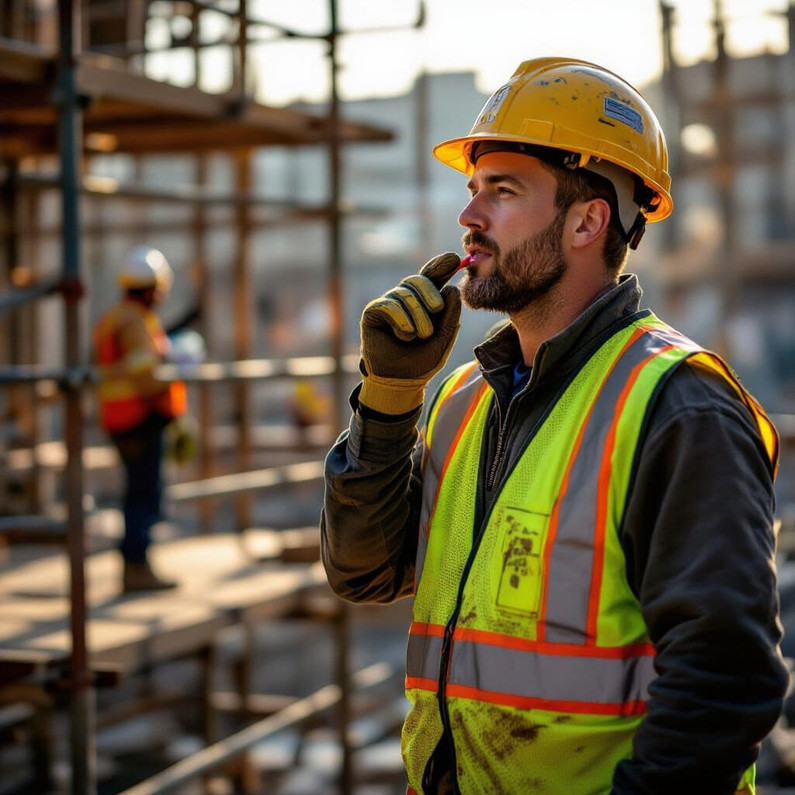Jobsite Superstitions: What Tradespeople Won’t Do (and Why)
Every trade has its quirks, but few groups are as rich in superstition as construction workers. Whether it’s refusing to whistle on scaffolding, never setting a hard hat on the floor, or insisting on knocking three times before a pour, these rituals are passed down from job to job like a secret code. Some are rooted in safety, others in pure tradition, but all reveal something about the culture and camaraderie of the trades.
At Southwest Scaffolding, we’ve heard (and seen) just about everything on a jobsite, and we thought it would be fun to share a few of the most common—and most unusual—superstitions from the field.
1. Don’t Whistle on Scaffolding
This one pops up around the world. Whistling on scaffolding, or any elevated platform, is said to bring bad luck or even accidents.
Where it came from: In old shipyards, whistling was how foremen gave crane and rigging commands. A stray whistle could be mistaken for a signal, causing a load to drop or a platform to move unexpectedly. The superstition stuck around, even long after whistles stopped being used as signals.
Modern meaning: It’s more of a “don’t jinx it” thing now, but plenty of workers still avoid it out of respect, and habit.
2. Never Lay Tools on a Bed, or Concrete
This one’s common among both tradespeople and homeowners. Setting tools (especially sharp ones) on a bed is believed to “cut” your luck or invite injury.
Likely origin: In older times, the bed was considered a place of rest and renewal; mixing it with work tools symbolized unrest or misfortune.
Jobsite version: You’ll also hear, “Don’t set your tools on fresh concrete” or “Don’t cross your tools.” Whether you believe it or not, it keeps tools where they belong—off delicate surfaces and away from damage.
3. Never start a job on Friday
Starting a new project on a Friday is still avoided by most crews.
The reason: Historically, Friday was considered an unlucky day to begin work, with roots going back to seafaring and even religious traditions. In construction, it evolved into a practical belief—if you start a big job on Friday, it’ll be rushed, and you’ll spend Monday fixing it.
4. Never Step Over a Coiled Hose, Rope, or Electrical Cord
You’ll see this one on masonry, concrete, and scaffolding crews alike. It’s said to “tangle your work” or “trip your luck.”
In practice: It’s a superstition that also happens to be solid safety advice—stepping over cords or hoses can lead to tripping hazards, especially on uneven scaffolding decks.
5. Don’t Toast with Water
When the crew celebrates a finished job, you never raise a water bottle. In some trades, toasting with water is said to “wish death to those not present.”
Where it started: The belief traces back to ancient sailors who toasted fallen shipmates with water. It’s now more about tradition—because after a long week on-site, there’s nothing “lucky” about toasting with plain water!
6. Lucky Charms, Coins, and Totems
It’s not all about what not to do—many workers have lucky charms they always bring on-site: a specific pencil, a coin in their boot, or even a “lucky” tape measure.
Why it sticks: In a trade where so much depends on timing, skill, and a little bit of luck with weather and inspections, having a ritual or token gives people a sense of control—and connection to past jobs that went right.
7. The First Brick
On masonry and concrete crews, it’s common to let the most experienced or senior worker lay the first brick.
Why it matters: It’s both superstition and respect, a symbolic start that “sets the tone” for the rest of the project. Many masons swear that the quality of that first action influences the whole job.
8. Never say it,s the last piece or "We will be done after this"
Never announce that the next task is the last one of the day; doing so is said to guarantee delays, breakages, or sudden extra work. Also, announcing that this will wrap up a project guarantees a long punch list.
Every crew knows: As soon as someone says “last one,” something inevitably goes wrong.
Why These Traditions Matter
Superstitions on the jobsite aren’t just about luck; they’re part of what builds the unique culture of the trades. They connect generations of workers through stories, habits, and a shared respect for the unpredictability of construction work.
And while not all of them have scientific backing, they do serve a purpose: they remind us to pay attention, stay humble, and maybe not tempt fate when we’re twenty feet up on a scaffold.
Whether you’re the type to knock on wood before a big pour or roll your eyes at the guy who won’t whistle on the platform, one thing’s for sure: construction crews have a language and lore all their own. And that’s part of what makes the job so much fun.
Join the Conversation:
What’s the strangest (or funniest) superstition you’ve heard on a jobsite?
Drop it in the comments below, or share this post with your crew and compare notes on who’s the most superstitious.
And remember: whether you’re setting up scaffolding, laying brick, or framing the next big project—stay safe, stay smart, and maybe don’t whistle while you work.
Recent Posts
-
Cold-Weather Scaffolding: When Winter Changes the Rules
Although Texas—home to Southwest Scaffolding’s headquarters—hasn’t experienced much of a winter this …Jan 6th 2026 -
What’s Ahead for Construction in 2026 — What Every Contractor & Scaffolding Pros Needs to Know
As we head into 2026, the construction industry is at a pivotal moment — shaped by technology, labor …Dec 31st 2025 -
What Happens When Scaffolding Is Installed Incorrectly
Lessons Learned (Without Naming Names) Scaffolding is one of those things most people don’t think ab …Dec 31st 2025




